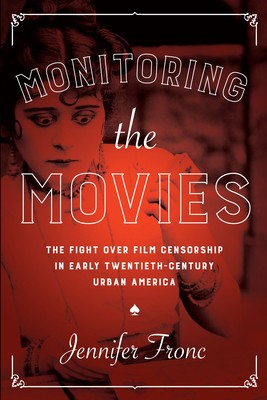
- We will send in 10–14 business days.
- Author: Jennifer Fronc
- Publisher: University of Texas Press
- Year: 2017
- Pages: 216
- ISBN-10: 1477313796
- ISBN-13: 9781477313794
- Format: 15.2 x 22.9 x 1.6 cm, kieti viršeliai
- Language: English
- SAVE -10% with code: EXTRA
Reviews
Description
As movies took the country by storm in the early twentieth century, Americans argued fiercely about whether municipal or state authorities should step in to control what people could watch when they went to movie theaters, which seemed to be springing up on every corner. Many who opposed the governmental regulation of film conceded that some entity--boards populated by trusted civic leaders, for example--needed to safeguard the public good. The National Board of Review of Motion Pictures (NB), a civic group founded in New York City in 1909, emerged as a national cultural chaperon well suited to protect this emerging form of expression from state incursions.
Using the National Board's extensive files, Monitoring the Movies offers the first full-length study of the NB and its campaign against motion-picture censorship. Jennifer Fronc traces the NB's Progressive-era founding in New York; its evolving set of "standards" for directors, producers, municipal officers, and citizens; its "city plan," which called on citizens to report screenings of condemned movies to local officials; and the spread of the NB's influence into the urban South. Ultimately, Monitoring the Movies shows how Americans grappled with the issues that arose alongside the powerful new medium of film: the extent of the right to produce and consume images and the proper scope of government control over what citizens can see and show.
EXTRA 10 % discount with code: EXTRA
The promotion ends in 21d.10:44:34
The discount code is valid when purchasing from 10 €. Discounts do not stack.
- Author: Jennifer Fronc
- Publisher: University of Texas Press
- Year: 2017
- Pages: 216
- ISBN-10: 1477313796
- ISBN-13: 9781477313794
- Format: 15.2 x 22.9 x 1.6 cm, kieti viršeliai
- Language: English English
As movies took the country by storm in the early twentieth century, Americans argued fiercely about whether municipal or state authorities should step in to control what people could watch when they went to movie theaters, which seemed to be springing up on every corner. Many who opposed the governmental regulation of film conceded that some entity--boards populated by trusted civic leaders, for example--needed to safeguard the public good. The National Board of Review of Motion Pictures (NB), a civic group founded in New York City in 1909, emerged as a national cultural chaperon well suited to protect this emerging form of expression from state incursions.
Using the National Board's extensive files, Monitoring the Movies offers the first full-length study of the NB and its campaign against motion-picture censorship. Jennifer Fronc traces the NB's Progressive-era founding in New York; its evolving set of "standards" for directors, producers, municipal officers, and citizens; its "city plan," which called on citizens to report screenings of condemned movies to local officials; and the spread of the NB's influence into the urban South. Ultimately, Monitoring the Movies shows how Americans grappled with the issues that arose alongside the powerful new medium of film: the extent of the right to produce and consume images and the proper scope of government control over what citizens can see and show.


Reviews